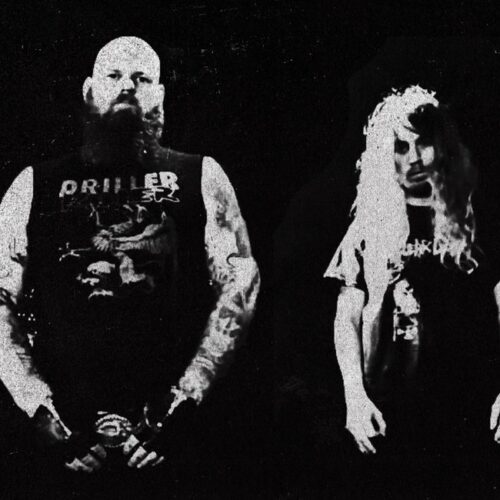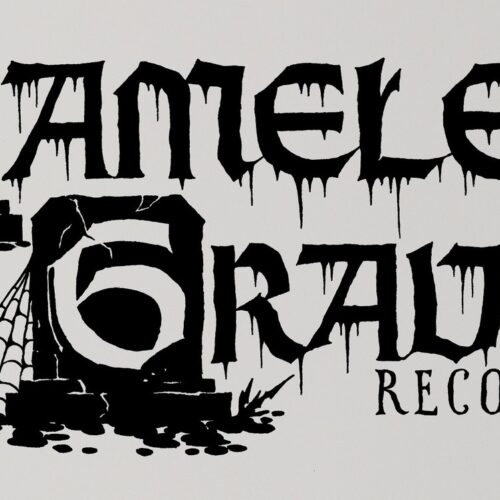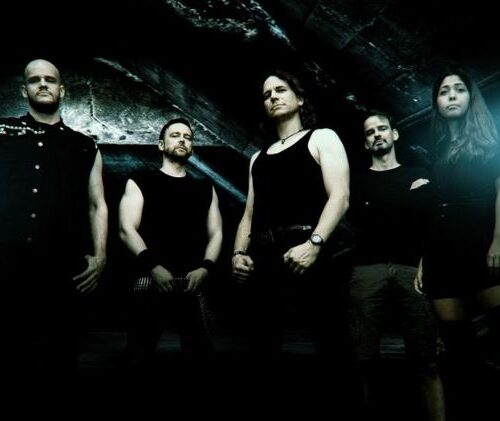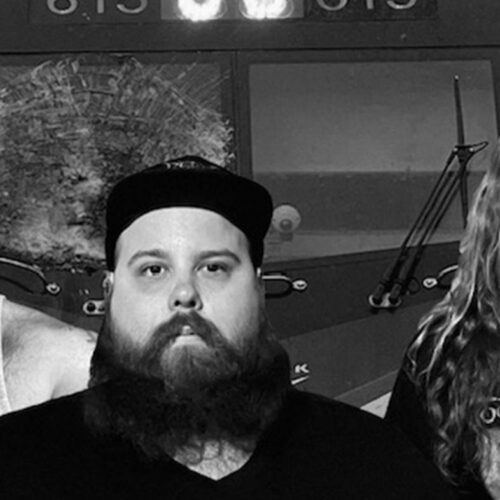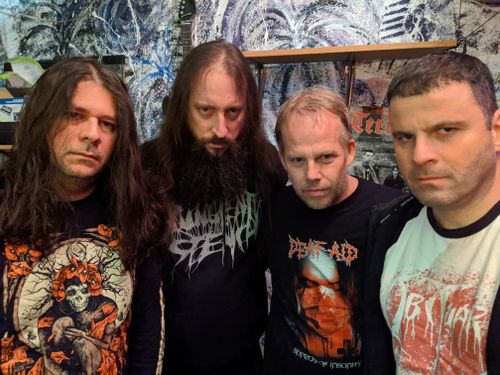Deadhorse Interview
Deadhorse is a death/thrash crossover band and I have known bass player Allen Price in what seems forever and I thought it would be fun to take a trip down memory lane with him, so here we go..
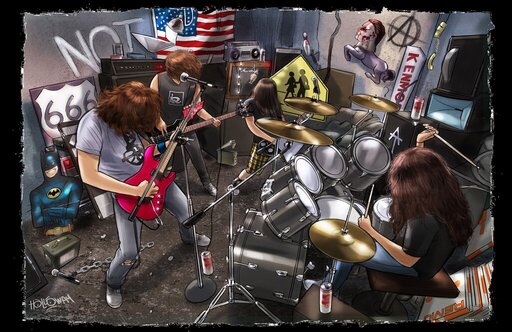
Now have you always lived in Texas all your life? What is it like living in Texas?
AP: Well yes, I’ve lived in Texas all my life. I’m not sure what I should compare it with because I’ve only lived in Texas other than my time in the military. It’s good to be in Texas because we have a tradition of independence and liberty. But, sometimes that independence in liberty gives us a black cloud over your heads and people think the wrong way about our values and the state. I don’t know how many times I’ve been asked about what it’s like riding a horse to work, or do I always have a gun on me or just some of the times. It’s got those stereotypical things that people really don’t understand. Texas has the best people from all over, we appreciate the basics and the fact that the land, taxes and utilities are cheap, the State does not steal from your employment wages.
Now were you into music at a young age or did that come later on? What were some of the first styles of music that you heard?
AP: Well I was lucky to be raised in an affluent family that came from extreme poverty, music was a way forward. One of the families down the street owned a Honda motorcycle dealership, so everyone gravitated towards them because they were really nice people, had motorcycles in the garage that they let people ride on and had a pool. I was the youngest kid around the block and after I had a subdural haemorrhage and almost died in the street. They all treated me with kid gloves. It was around, I don’t know maybe 1981 to 1983 that I was down the block and listen to some AC/DC, Rush and some Rolling Stones and realize that music was the thing for me. I was already an Elton John fan, but I really didn’t understand what music and instruments were all about. Around that time I had a cousin up in Dallas that showed me how to play Limelight by Rush, on his Les Paul, and it really took me away. When I came home I told my dad I wanted to take guitar lessons and years later I was able to have a guitar and learn how to play and then I saw a friend of mine come over to the house and play eruption by Eddie Van Halen on my shitty little guitar, which I hardly could play and that’s why I started to play bass. I was lucky because my sister turns me on to bands like Kiss, ELO and The B-52s. Those were the foundations of the bands I heard that made me want to play music and made me definitely want to be a rock star, but I never was that thanks be to god.
Now how did you discover heavy metal music in general? What were some of the first bands that you heard and are you still into any of them these days?
AP: Well as far as heavy metal was when I heard kiss the first time. Several years later around I heard AC/DC and Rush. I really didn’t have the concept of heavy metal in my mind because I was very, very young. But, there was a time when I won some money at a bingo hall and I had extra money in my pocket so I went to Texas tapes and Records there in Pasadena Texas, where I was growing up and I bought several albums just based upon the artwork on the cover. That’s around the time I bought some WASP, Celtic Frost, Slayer, ICON, and several other bands that I had never heard of before. When I played the WASP EP, it was a two-song vinyl picture disk. It had F*** like a Beast on one side and I don’t know “I want to be Somebody” or something else on the other side and I didn’t know, I needed to play it that 45 speed but I played it at 37 speed and it was the heaviest s*** I’ve ever heard in my life. So after that, I had a pretty warped mind about thinking of how HEAVY music should sound or could sound and it was not long after that I heard bands like Black Sabbath, Iron Maiden and Judas Priest. But I’ve always been a big Rush fan.
How did you come to discover underground music? What were some of the first bands that you heard? Are you still a fan of any of these bands these days?
AP: Well as far as underground music that is kind of hard question to answer because what was considered underground back then? And it is considered mainstream now. I guess some of the bands that stick in my craw are bands like Godflesh, Napalm Death and years before that Slayer and Celtic Frost. I found importance enjoyment in bands that seemed crossovers. I was not a big punk fan, big thrash fan but when they spun in a mixer the hardcore them to me prevailed. I really personally don’t care for death metal lyrics for the growling and all that s*** I really don’t. I understand why people like it and I don’t hate it but it’s just not part of my music repertoire, nor do I listen to it on a daily basis.
Now back then in the oldie days, haha, was there stores that carried underground music? How did you get your to fill for listening to these bands back then?
AP: Like I mentioned earlier Texas tapes and Records was a big weigh station for bands and music lovers that exposed us all to different styles and the fans were able to meet the band’s back then. I really couldn’t afford to buy a lot of music but when I did it was usually King Diamond or Rush or I spend money on blank tapes to record music from people that had music. That’s one thing that I think people take for granted now and don’t know how it was back in the 80s 90s and even up into 2000. You really weren’t able to listen to the music you wanted to because you didn’t have it unless you went out and found it and made copies of it and took it home and listen to it, and you may not even know the titles of the album or songs. Now you can just YouTube it, Google it, or LimeWire type P2P download it. We’re talking 30-40 years ago.
Did you ever do any tape trading back in the day or read many zines before the forming of Deadhorse?
AP: Well not really and I’ll tell you why. I didn’t do tape trading because I couldn’t afford postage because I was the guy that owned the PA and was the gear head of Deadhorse. I was the only guy that had a tuner and I was usually let one of those guys use an amp or something to make it to a show. And as far as fanzines, I was 17 when I started playing with Deadhorse so I didn’t even know what a fanzine was they may have been around but it was something that I tried to get like tape trading it wasn’t part of my every day. I was just trying to keep up my job at Taco Bell, keep up rehearsals and keep up my grades because I was still in school. I was lucky to have some gear and a foster or 4 track so that helped.
Now, what made you decide to pick up the bass? Ever take any lessons or self-taught? Who are some of your favourite bass players?
AP: I have mentioned earlier why I wanted to play the guitar, but the main reason I started playing the bass was the guitarist mentioned on our first album Rob. Robert Moore and I met in the principal’s office in like seventh grade. I was probably like 12 and him 13 or so. He was such a good guitar player there was no way I thought I’d ever been able to play the guitar as good as him, so I figured I’d get a bass and we both started a band, my first band called Stress. I took some lessons to learn how to read a little bit of music and play the bass in general. I took some bass lesson from the bass player of the Latino Tejano band La Mafia, back in 1982 or 1983. His sister was the receptionist that my dad’s dental office so that’s how I met him. But after I heard Geddy Lee playing bass pretty much made me want to play bass the rest of my life. With bass players like John Entwistle, Geezer Butler, Michael Anthony, Steve Harris, John Paul Jones and Bob Daily why play the guitar? ….heck there is no way I couldn’t do all that fancy stuff like Randy Rhoads or Eddie Van Halen…Lol.Hell, let alone Cliff Burton.
Now at what age were you when you entertained the thought of forming a band?
AP: I formed and founded my first band when I was 13 with Rob Moore and David Biggs. We are a trio and we played our Junior High choir disco at school. We played the Crazy Little Thing Called Love and maybe pearl necklace by ZZ Top some kind of ZZ Top song. Was it the band Stress I mentioned earlier?
Was it hard to find other members back then?
AP: It really wasn’t hard to find the members of the 1st band Stress. We all kind of fell in each other’s laps. Later on we added the keyboard player when Van Halen’s 1984 jump came out.
Deadhorse was a different story. Greg, Robert and I had played for years with Randy Haaga in the band Ace Thrasher. Randy was the brother of Mike Haaga’s brother. We had the band Axe Thrasher for many years probably 1984 to 85. Rob had gone into rehab, so I started my own band Medusa with all new players. Greg and Rob got back together with a new drummer Ronny Guyote with a local bass player Steve Will, he was a badass. For some reason, Rob showed up at a Medusa practice and privately asked me to audition for their band because they lost Steve. I worked with Rob on the tunes and did the audition and was asked to join that day. Sometime later Greg talked Muke into being our vocalist and after the 1st demo, Rob was back in rehab so when went in without him. A big circle of friends, but Ronnie came in as an outsider.
How long did it take before you finally got a stable line-up and started to write songs?
AP: Well a lot of stuff changed after I met Greg Martin. After I met Greg, we had the idea of making an original band with original music and created a band called Axe Thrasher. We eventually became a five-piece band where it was Greg Martin on guitar, Robert Moore on guitar, me on bass, Randy Haaga on drums, and a guy named Dave Mize on vocals. We rehearsed and wrote songs for probably about seven to eight months. Before we played our first show, Corners teen club. It was a totally different thing but I was still 11th grade maybe 10th grade actually and we had some good times. This is all pretty Deadhorse.
Now from the starting of the band, was it decided you were gonna be the singer or did that just fall in your lap so to speak?
AP: Well that’s a weird question. When Deadhorse started we were a five-piece band in my case it was just a vocalist. We lost our guitar player Rob Moore to drug rehab and decided to let Mike play guitar and sing. Years later when Mike left the band I ended up singing for a while we got another guitar player who was supposed to be able to sing a bit but it only lasted a couple of years. Then in 2011 when we got back together, we realize we really needed to find a good vocalist. That’s when my cargo took over vocals and we just took off from there. We enjoyed 7 years of good and had a lot of fun.
So now how did you come up with the name Deadhorse? Looking back do you wish you had named the band with another name?
AP: Initially I hated the band named Deadhorse. We had gone through several name changes and we’re considering a bunch of different names when Greg and Mike came to practice with the band named Deadhorse. Ronnie and I hated it and we argued about it but they got Ronnie drunk one Friday night and convince them that the band name should be Deadhorse and they outvoted me it’s.. just as simple as that. I don’t look back at that it is what it’s and it worked.
Now how long was the band around before the 1988 6 song demo out?
AP: Maybe 8 months before the 1988 demo, that was the 2nd or 3rd demo at that point.
Were these pretty much the first 6 songs that you learned and you just went into the studio to record them?
AP: No we had left earlier songs off the demo like Let Dance and a few more.
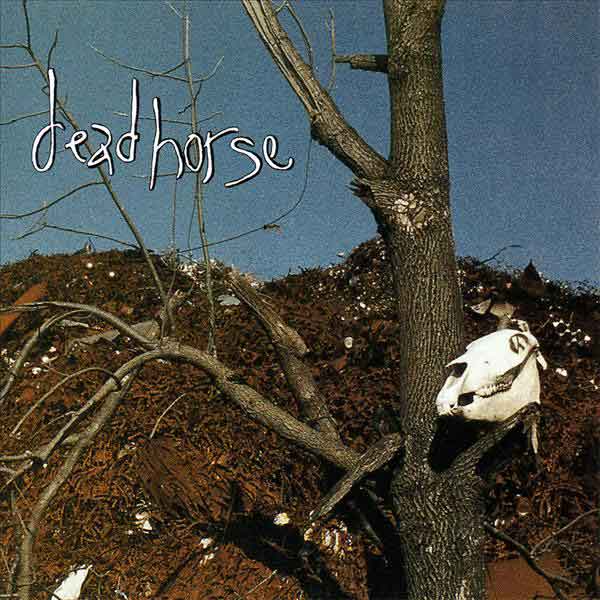
Now how was the response to the demo when you released it? Did you send it out to many fanzines and stuff?
AP: I got to be honest with you after we recorded the demo we thought it was pretty cool but our music really wasn’t that great compared to other stuff that was around at the time. It wasn’t like we were sitting it out thinking goddamnit we love our music we are so f****** awesome. The only reason fanzines got it is because local tape traders and some shows and Randy and Mike would send it to him. We were very very fortunate to have the exposure we did when we did, as we did because we really were too poor to try to do anything else with our music beyond the demo.
Now your demo, did you get that professionally done or did you just dup them when you needed copies of it?
AP: Professional as we could afford to make the tapes, the rest was made at Kinko’s.
Did you get to play many live shows at the time as the scene was starting to get strong by the late ’80s?
AP: Just a few. We only would play every 4 to 6 months that way we didn’t over saturate. We wanted it to be special.
I remember this release when it came out way back and wow was it a great mix of blazing speedy hardcore ish thrash. I imagine the response to it was overwhelming positive am I right?
AP: Well, yes and no. It was not sonically as good as Helstar but was unlike anything you could find. It was unique. We had a limited budget and time. Our performance was spot on with no overdubs.
Do you know around how many copies of this you sold?
AP: Maybe 1000 to 2000 LPs and Tapes. 1000 to 1500 or fewer CDS. I really don’t know. Our management at the time was loose and we were not being told much.
Now in 1990, you released a 10 song demo. Was this mostly for record labels as your next release came out on a label?
AP: Well it was called demo 90 because it was for the labels but we needed to make some scratch too so was released locally too.
I imagine the Texas scene was strong down there with bands like Devestation, Angkor Wat, Absu, Thornspawn, etc. Were there many places for underground places to play and for people like you to see or open up for bigger touring acts at the time when they played Texas?
AP: There were fair clubs to the playbook in n all the cities we needed to play. The double-edged sword was we could play with bigger acts and make nothing to 100$ or headline and make good money, did I mention we were poor bastards. We could have really benefited from better management and accounting. I remember going to the shirt printing shop and the owner said “in this batch is your 10 thousandth shirt” ..I said, “we have sold almost 10,000 shirts? And of course, our manager and his brother changed the topic loaded them up and pretty much acted like it was no big deal. That was when we started smelling ROT.
Now in 1991, you hooked up with a label, Big Chief Records, for a full-length release called “Peaceful Death and Pretty Flowers”. What was it like working with Big Chief Records as they were a new label back then and not established like Metal Blade, Combat, Noise, Earache, Music For Nations, etc? Was a mistake we regret to this day. Were any of the other biggie indie labels interested in you, or did you decide to take a chance and work with this new label?
AP: Well Big Chief did give us 3x what Metal Blade offered but we should have gone with MB. No other labels showed much interest at the time.
Now you also did a cover of The B’52’s hit song called “Rock Lobster”. Why this particular song and thoughts on this album and song these days, please.
AP: We had considered a lot of different songs, but when the mention of Rock Lobster came into the picture it was pretty much a no-brainer because we all love the B-52’s. The fact that we are talking about peaceful death and pretty flowers 30 years after it was released to me is a testament to that kind of underground album from a band like us.
Did you get to play many live shows or do any mini-tours behind your 1991 release?
AP: Yes, not many tours just an Entombed 34 show deal.
I’m not gonna ask about what a live show is like cause you have a 2012 DVD called “Making a Dead Horse Live!” to see for themselves. Who have you shared the stage with over the years?
AP: Not as many as you would think, but Pantera and Mr Bungle are worth the mention. Like I said we never had good management.
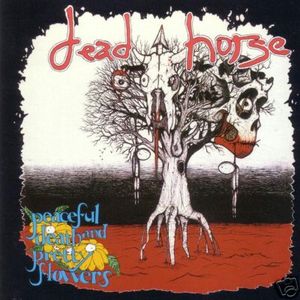
Now it took 3 years to see a new release, and that was in the form of an EP called “Feed Me”, which I’m assuming came out on your own label. Why only an EP? Was this to show people you were still around? Did you send it to any labels at all and if so what was the feedback like?
AP: So we did the Feed Me as a demo for Interscope Records and another label out of California Restless Records, I think, I can’t recall at this time. It took us three years to write those songs because we couldn’t write music anymore because of the damage that was done while writing peaceful death and pretty flowers. It was pretty much like the Beatles where John, Ringo and George would get together and then Paul, Ringo, and George would get together and write songs but they never would get together and write songs together. When we did get together we couldn’t write songs because there was so much hatred, animosity and no respect anymore. I won’t sit and point fingers but as you can see after reuniting in 2011 by 2013 we had a new CD and by 2017 and a new Full length and that was with minimal writing together and very few rehearsals. Dead Horse had the beat time from 2011 to 2018 than we ever did. We made more money and played about the same. Amount of shows as in the past. And to this day, Ronny, Greg, Scott, Argo and I are great friends and would do it all again if able. We have a chemistry that many bands lack and are brothers to the core.
Now before your next release in 1996, your original singer, Michael Haaga, had departed the band. What happened there?
We were having a lot of personal issues in the band both with each other and our families. There were a lot of skeletons in the closet and sins of the past that could not be forgiven. The last conversation that I had with Michael Hagga in 1994-1995 was pretty much like this. Mike told me that he had to have complete control over the band, the art, and all the writing. To which I told him we should all decide on the future and the art and if he wanted to write, we would accept that as long as he accepted the songs we wrote. That is why Feed Me is what it is. Half the songs are sung by Greg and Half by Mike. Mike refused to sing unless he wrote the lyric and wanted 100% control over it all. That was not what Deadhorse was about. We are 101% anti-narracist.
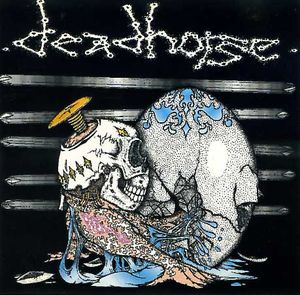
Looking back how do you feel Scott Sevall fit in the band and had the musical style of the band changed much by then?
AP: Scott at the time was the man we needed at the time we needed him, but none of us wanted to sing. I ended up singing the majority of the set. That all led to our decline, we needed to just be on the music.
Now in 1999, Relapse Records re-released 2 of your releases, namely “Horsecore” and “Peaceful Death”. How did this come about?
AP: Long time relationship with Relapse, and Matt was a fan.
Were there any bonus tracks on either one of them?
AP: Yes.
Were any other labels interested in re-releasing these 2 releases?
AP: Not other than Relapse.
Now the band broke up at some point. What wear was it exactly and what made the band broke up or did you guys just take some time off, which ended up being until 2011?
AP: At some point in 1996 Scott left or got let go. Greg, Ronny, Alpo and Mike BBQ started an industrial band called Jack Ass. But then life to over and Alpo decided to get out of the music altogether, followed by Greg. Ronny kept on for a while with a band Nothing and Deth Culture BBQ, not long after that.
Now in 2011, you played some reunion shows. From the last known line-up, who was in the band for these reunion shows?
AP: So in 2010, I was approached by Scott Sevall who was the founder of the new band Pasadena Napalm Division, with Kurt Brecht of DRI, Greg Martin, Ronnie, and Mike Titsworth of Angkor Wat. They were just finishing their debut album and wanted to know what I thought about a DH reunion. I was not opposed to the idea but knew that 1, We needed a frontman/lead singer and 2. There was no way it would be Mike Haaga. We rehearsed a guy and like with Scott in 1995/96 knew he was the guy after the 1st session. I later took over the bass role for PND as well.
Now these re-union shows, this is what also resulted in the DVD release of you guys?
AP: Yep. We thought there would just TV be 1 show.
On your page, it says the DVD is over 3 hours! Did you tape a couple of shows or is there other stuff on the DVD like some old shows footage, interviews, etc. Fill me in on what is on this DVD and is it still for sale?
Ap: It is 30 to 40 minutes of the reunion show. 8 to 10 songs from the shows that follow, a full band interview and 5 individual interviews. We have about 20 or 30 left out of the 1000 made.
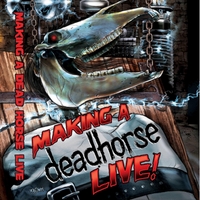
How did you hook up with Abyss Records who re-released the “Boil(ing) EP on vinyl? Was that like a limited edition type of thing?
AP: They had done a small release with PND and were FH fans from way back. Dan is still a good friend of the band.
Now in a 14 song EP was released with 4 studio tracks and 10 live tracks and this featured a new singer, Michael Argo and drummer Ronnie Guyote. Where did you find them both and looking back how do you feel they worked with the band and what are your thoughts on having some newly recorded studio stuff released after such a long time?
AP: Ronny was our original drummer from forever. Mike Argo came as referrals from a close friend of PND bubba.
We did release The Beast that Comes in 2017 full LP with all new songs with the 2011 line up, that has not changed.
Clarification:
Oringinal band
Alpo/ Allen, Greg, Ronnie, Mike Haaga
Horsecore, PD&PF, Feed Me
1995 Mike Haaga quit / subtracted
1995 Scott Sevall was added
BOIL(ing)
Alpo, Greg, Ronnie, Scott
2011 Mike Argo added
Making a DH Live – DVD
Loaded Gun DVD
The Beast that Comes LP/ CD
2011 to 2018 same line up to this day..Greg, Alpo, Ronnie, Scott, Argo
Now it took 3 years before we saw another release from the band, which was a 2 CD compilation. Now, what were you guys doing as a band from 2013 till 2016? Were you playing many live shows and such?
AP: That was just a Rereleased compilation of all the Mike Haaga era Deadhorse. Horsecore, PD&PF, Feed Me and the demos. We played 24 to 30 live shows a year from 2011 to 2018.
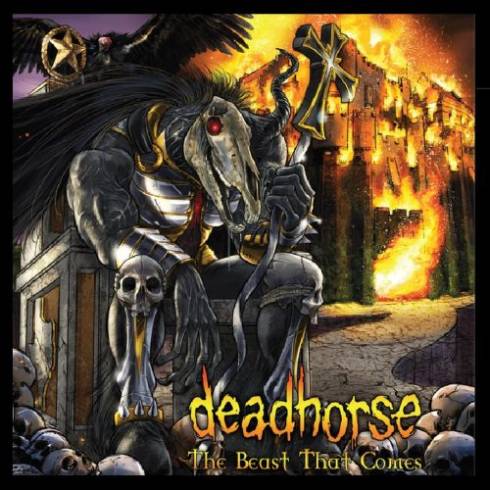
Now we come to your latest and maybe your last release called “The Beast That Comes”, which came out in 2018. What was the feedback like off this release?
AP: Honestly not much feedback at all, ?? I think people may have been surprised.
What are your thoughts on it?
AP: Greg and I think it is the best record since Peaceful Death. It is a quintessential Deadhorse. People should buy it and find out.
Now here we are in 2021. Are the band still together for the most part or are you just playing shows here and there, minus the COVID shit?
AP: We have some great opportunities come our way in 2018 that we had to turn down because we all have day jobs that support our families that we could never ever quit. So at that time, we made a decision as a band to stop playing and spend time with our families and our children and pursue our jobs and make good livings for families. We didn’t break up we just stopped playing.
Will you ever enter the studio again?
AP: We have all talked about doing another studio album but it’s pretty much just in the planning phases. And we really haven’t been writing together. I know a lot of bands send tracks back and forth here in there, but I know as the leader of Deadhorse that can be more stressful than it’s worth. It’s best just to get us all in a room and plugin and throw down and let the music happen. That’s what we did when we wrote the Beast that comes. And that’s what we did when we wrote our original album Horscore. We checked our egos at the door, we were all great friends, and we just wanted to make some great music that people enjoyed.
Now you were like me in some ways, when the band formed, tape trading and fanzines were the rages as well as writing letters. Now it’s all about Facebook, downloading, 100’s of labels, Bandcamp, etc. What are your thoughts on today’s technology available to bands these days?
AP: I find it much easier and cheaper to do it today. But young folks don’t know the original struggles. However, there is over-saturation. And the attention spans are smaller. It has its ups and downs.
Craziest show you ever attended and craziest show you ever played?
AP: Attended: GWAR, hands down.
Played: still waiting, maybe MR Bungle.
The biggest regret you have or wish you would have done differently?
AP: We should have done our LP Horsecore in Dallas with Danny Brown and done PD&PF at Morrisound Studios in Florida. We got pushed into hasty bad decisions by management in the field to be patient to make sure that we got the best producer for each project. I nothing against the people we worked with I just don’t think we went the right places because we could have had a lot better results.
Do you still have a lot of your fanzine reviews/interviews boxed away somewhere?
AP: No, lost everything in a bizarre gardening accident.
Do you see or talk to any of your old members or members from the last line-up you have/had?
AP: Yes, other than Mike Haaga we are all close friends.
Has any band to your knowledge done a Deadhorse cover tune?
AP: Oie, Entombed did Scottish Hell.
Please plug any Deadhorse merchandise or releases you have for sale and also social media sites for the band.
AP: We got:
Horsecore.net
deadhorse.com
Allen horses up for doing this chat and going back in time with me. Any last words to wrap this up?
AP: You can lead a horse to water, but you can’t lead a Deadhorse anywhere.


